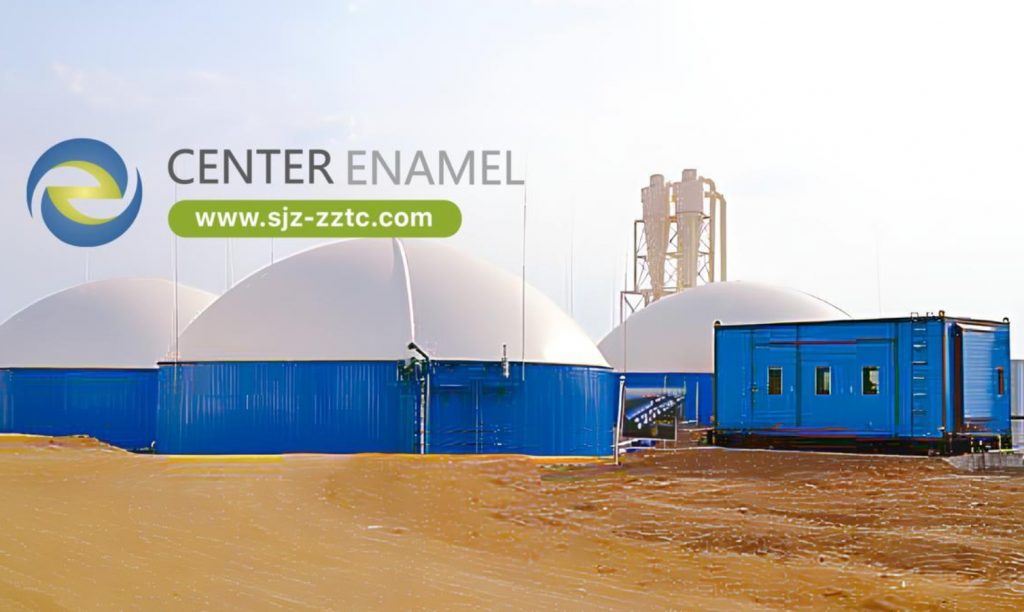Industrial Biogas Reactors for Converting Urban Food Waste to Renewable Energy

Urban centers generate vast quantities of food waste every day, presenting both an environmental challenge and an opportunity for sustainable energy production. Center Enamel has developed advanced industrial biogas reactors specifically engineered to convert urban food waste into renewable energy. By harnessing the biochemical potential of organic waste, these reactors not only mitigate the environmental impact of landfill disposal but also contribute to the transition toward a circular, low-carbon economy.
Cities across the globe face mounting pressure to manage the enormous volumes of food waste produced by households, restaurants, and food processing industries. Improper disposal of this organic material can lead to increased greenhouse gas emissions, environmental degradation, and lost opportunities for energy recovery. Traditional waste management methods, such as landfilling or incineration, often fail to capture the full value of food waste. In contrast, anaerobic digestion (AD) offers a sustainable alternative by transforming this waste into biogas—a renewable energy source primarily composed of methane and carbon dioxide.
Industrial biogas reactors represent a critical technological advancement in the field of renewable energy. These systems are designed to process large volumes of organic waste efficiently and safely. At Center Enamel, our reactors are meticulously engineered to optimize the anaerobic digestion process, ensuring high biogas yields and stable operation under industrial conditions.
The process begins with the controlled decomposition of food waste in an oxygen-free environment. Microorganisms break down the organic matter, releasing biogas as a byproduct. This biogas can then be captured and utilized in combined heat and power (CHP) systems, upgraded to biomethane for grid injection, or employed in other energy applications. The remaining digestate, rich in nutrients, can be used as a high-quality organic fertilizer, thereby closing the loop in urban waste management.
Key Features of Center Enamel’s Industrial Biogas Reactors
- Optimized Process Control
Our reactors are equipped with advanced monitoring systems that allow for precise control over operational parameters such as temperature, pH, and retention time. This level of control is essential for maintaining an optimal environment for microbial activity, thereby maximizing biogas production. - Robust Design and Scalability
Designed for industrial applications, Center Enamel’s biogas reactors are built to withstand the rigors of continuous operation. Their modular construction enables scalability, allowing facilities to expand processing capacity in line with increasing volumes of urban food waste. The robust design also ensures resilience against fluctuations in waste composition and feedstock variability. - Enhanced Safety Measures
Safety is paramount in the design of industrial anaerobic digestion systems. Our reactors incorporate multiple safety features, including redundant pressure relief systems and real-time gas monitoring, to prevent the accumulation of hazardous conditions. These measures not only protect plant personnel but also ensure compliance with stringent environmental and industrial safety regulations. - Energy Recovery Optimization
The reactors are engineered to minimize energy losses throughout the digestion process. By capturing and retaining the biogas produced, our systems ensure that a higher proportion of the energy potential inherent in food waste is converted into usable energy. This optimization contributes to improved overall efficiency and a reduced carbon footprint. - Integration with Urban Infrastructure
Center Enamel’s industrial biogas reactors are designed with integration in mind. They can be seamlessly incorporated into existing urban waste management systems and energy grids. This compatibility facilitates a holistic approach to urban sustainability, whereby food waste is transformed from a disposal challenge into a valuable resource for renewable energy generation.
Environmental and Economic Benefits
The adoption of industrial biogas reactors for urban food waste conversion offers significant environmental and economic advantages:
- Reduction in Greenhouse Gas Emissions: By diverting food waste from landfills, biogas reactors mitigate the release of methane—a greenhouse gas with a global warming potential many times that of carbon dioxide.
- Renewable Energy Production: The biogas generated can replace fossil fuels in energy production, thus reducing reliance on nonrenewable energy sources and contributing to a lower carbon economy.
- Waste Management Efficiency: Transforming food waste into energy reduces the volume of waste requiring disposal, easing the burden on municipal waste management systems.
- Revenue Generation: Facilities can benefit economically by selling excess energy to the grid or through government incentives aimed at promoting renewable energy technologies.
- Nutrient Recycling: The digestate produced as a byproduct can be repurposed as an organic fertilizer, thereby supporting sustainable agriculture and reducing the need for chemical fertilizers.
Center Enamel’s Commitment to Innovation
With decades of experience in the storage and renewable energy sectors, Center Enamel is at the forefront of technological innovation. Our industrial biogas reactors embody our commitment to sustainability and engineering excellence. By focusing on research and development, we continuously refine our reactor designs to improve efficiency, enhance safety, and reduce operational costs. This dedication to innovation ensures that our solutions remain competitive and effective in addressing the evolving challenges of urban waste management.
For urban planners, waste management professionals, and renewable energy investors seeking a proven solution to the challenges of food waste, Center Enamel offers a technologically advanced and economically viable option. Contact Center Enamel today to learn how our industrial biogas reactors can help transform urban food waste into a renewable energy asset for a sustainable future.
